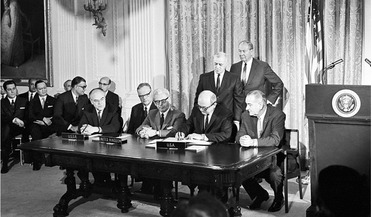 29 December 2021
China complains to UN after space station endures 'close encounters' with Starlink satellites
29 December 2021
China complains to UN after space station endures 'close encounters' with Starlink satellites
... the Moon and Other Celestial Bodies 1 (the Outer Space Treaty), which provides that “States Parties to the Treaty shall immediately inform the other States Parties to the Treaty or the Secretary-General of the United Nations of any phenomena...
 September 2021
Near space - the air-space boundary question, astronauts and space tourism
September 2021
Near space - the air-space boundary question, astronauts and space tourism
... activity. As both Branson’s and Bezos’ activity occurred within the United States, under Article VI of the Outer Space Treaty it fell upon the Federal Aviation Administration (acting under 51 USC §50905) to license both flights. Given that...
 October 2021
A US space strategy for 2050: shaping a domain on the cusp
October 2021
A US space strategy for 2050: shaping a domain on the cusp
... as the “Wild, Wild, West”. Technology has advanced to a point where the foundational 1967 Outer Space Treaty has become obsolete. The treaty bans weapons of mass destruction, prevents military activity on celestial bodies, and charts peaceful uses...
 March 2016
Building Confidence and Reducing Risk in Space Resources Policy
March 2016
Building Confidence and Reducing Risk in Space Resources Policy
... internationally. As the IISL states in its December 2015 ‘Position Paper on Space Resource Mining’, the new US Act is ‘a possible interpretation of the Outer Space Treaty. Whether and to what extent this interpretation is shared by other States...
 March 2016
Future space is challenge for international law
March 2016
Future space is challenge for international law
... place due to the fact that the Moon Agreement is not as popular as the OST and the other space treaties. Consequently its provisions are not binding to a large majority of spacefaring nations. It should be added that despite the...
 August 2016
Exploring the problems of criminal justice in space
August 2016
Exploring the problems of criminal justice in space
...) which contained Article 22 with specific provisions relating to crimes committed onboard the ISS. Unlike the Outer Space Treaty and the proposed Draft Convention mentioned above, the IGA uses the criminal law of the state...